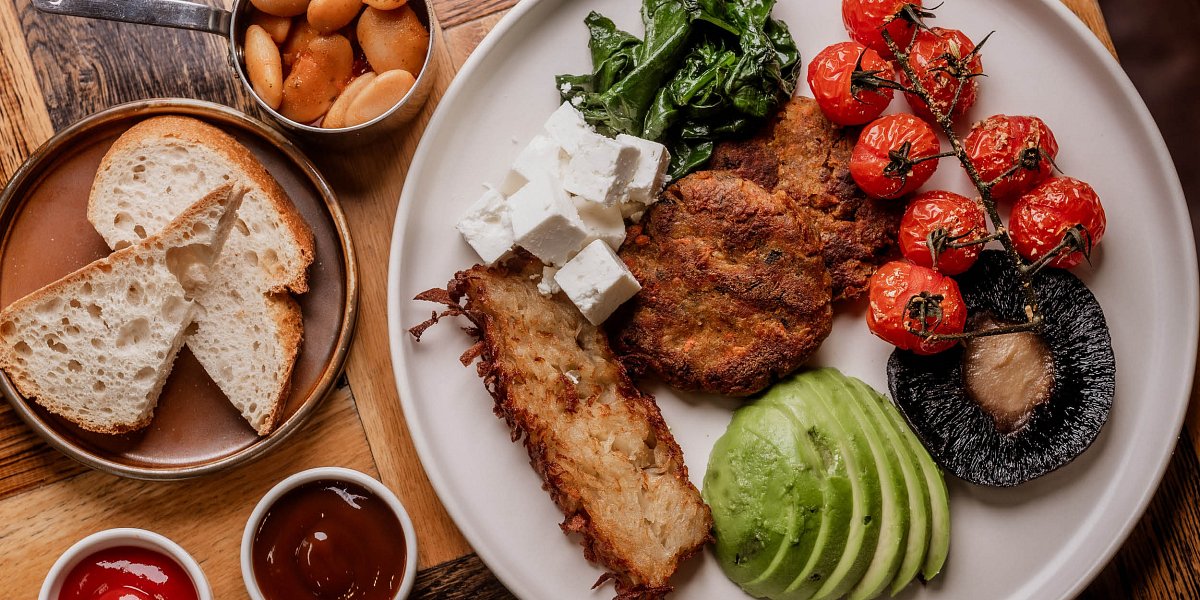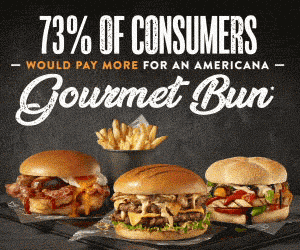Feature: Vegan food
With veg-focused techniques, dairy alternatives and meat substitutes revolutionising the plant-based domain, out-of-home punters are not willing to settle for lacklustre vegan menu options.

The vegan market of today is virtually unrecognisable to that of just 10 years ago. The alternative meat segment has exploded and remains rife with innovation, while a collective appreciation for the health properties and versatility of fresh fruit and veg means customers can’t get enough of creative (and delicious!) meat-free recipes. In 2021, plant-based products held a global market size verging on £16bn – a figure which, according to Statista, is set to soar to over US$22bn by 2025. Clearly, the collective hunger for quality vegan eats isn’t satiated yet!
Long-term growth in the plant-based category is being steered by the UK. It’s one of the largest markets in Europe, growing by 9.58% year-on-year, with London becoming the world’s first city to surpass 200 exclusively vegan outlets in 2022. A recent YouGov survey found that 6% of Brits identify as veggie, 12% as flexitarian, 3% pescatarian and 2% vegan. So, while the number of consumers following a strict vegan diet seems relatively small in comparison, the increase in those flexing their diets to incorporate more plant-based meals is what has predominantly caused the market to boom in recent years (CGA by NIQ, 2023). Mintel reports that over 7.2m Brits actively follow a meat-free diet – 1.6m of whom identify as vegan. With that in mind, it’s essential that restaurant menus across the UK reflect growing demand for dishes that are both tasty and entirely free from animal products. In the words of Paul Saunders, marketing manager for flavour specialist Major International: “Pub and bar operators should take note of the importance of a quality, varied vegan and vegetarian offering at each mealtime. No longer is it acceptable to have a single vegetarian dish, almost as an afterthought. Customers are looking for choice and variety.”
Plant-based: for the planet
There’s no doubt that the climate, nature and health crises we face have multiple contributing factors, but international academics agree that intensive animal farming is a major cause. In 2016, the United Nations reported that food production, when not sustainably managed, is a key driver of biodiversity loss; a polluter of air, fresh water and oceans; and a leading source of soil degradation and greenhouse gas emissions. Global food production industries also contribute to antimicrobial resistance and non-communicable diseases, as well as emerging and foodborne illnesses. They create poor conditions for workers and leave farmers and suppliers vulnerable to price squeezes, while also, crucially, leaving farm animals at risk of being kept in cruel and inhumane conditions. With all that down on paper, it’s hard to argue the case for continued meat production on such a colossal scale. In the words of Dr Tracey Jones, global director of food business for Compassion in World Farming (CWF): “Systematic change is urgently needed in our food system not only to ensure a better life for farm animals, but to secure the very future of the planet. By making small changes to our diets each day, we can make a huge difference, and there are clear opportunities out there for food outlets to lead the charge.”

Plant-based eats courtesy of QuornPro
Consumers’ heightened focus on sustainability has allowed operators to expand their plant-based propositions. The expectation for businesses to be proudly implementing steps to reduce their environmental impact remains strong. Interestingly, despite the cost-of-living bite, one-third (34%) of on-trade visitors are prepared to spend more in venues that demonstrate positive sustainability credentials (CGA by NIQ). “With hospitality operators under pressure to reduce their environmental impact in the next decade, increasing the number of plant-based options is an effective way to minimise your menu’s carbon footprint,” says Karen Heavey, brand manager for dairy and non-dairy product specialist Kerrymaid. “Meat and dairy will of course remain on menus in the years ahead, but offering a variety of alternatives is increasingly important to consumers.”
But it seems that Brits are actually falling out of love with red meat, according to reports, with the nation chowing down less this year that has ever been recorded before. “Red meat consumption has been seen to plummet by up to 81% since the 70s, for reasons including the cost of living and consumers becoming increasingly health-conscious,” says Edwin Bark, senior vice-president of Redefine Meat.
The dairy substitute market, on the other hand, is flying. In 2020, one in three people were regularly purchasing plant-based milk (Mintel), with Brits spending £100m on such products, firmly establishing the segment as mainstream. “We have been working on a number of puddings with plant-based alternatives,” says Ella Cranmer, food marketing manager at Fuller’s. “We’ve been able to get creative with ingredients such as oat milk custard. There are also several new milk alternatives emerging, beyond the well-established oat and soy milks, such as rice milk, which has a more subtle flavour and, therefore, can be used in more dishes. We continue to monitor these trends and use them in our dish development.”
Jo Rudkin, national account manager for Oliver Kay, a Bidfresh brand, has also recognised consumer preferences shifting towards more veg-centric dishes – a trend she calls ‘Plant Power’. “It’s about using veg as the hero ingredient, without the need for meat or mock meat,” she explains. “This year has been riddled with the cost-of-living crisis and food inflation, meaning the price of meat has rocketed. And the more ethical and sustainable the product, the more expensive it is. Many mock-meat and poultry items are more costly because of the production methods. It’ll therefore pay for you and your consumers to stick with the fruits of the earth.”
Recent research by Funnybones Foodservice further confirms this trend, indicating that wholesome veg is stealing the spotlight in the plant-based space. “This is particularly the case for beans and mushrooms, which would typically be found in traditional international dishes regardless,” says Tom Styman-Heighton, development chef for Funnybones. “Operators favour these products thanks to their cost-effectiveness and familiarity, adding to the authenticity of globally inspired dishes. Bolder caterers are offering more adventurous plants as the star of the show, however, including plantain and nopalitos, aka cactus strips – perfect in dishes such as tacos, salads, enchiladas and salsas.”

Menuserve Gluten-Free Vegan Asian Prawn Snack Selection
The more, the merrier
The surge in flexitarian diets means that increasing the number of plant-based items on your menu immediately makes your business more accessible. The scope and variety of this offering means it’s able to cater for everyone regardless of their dietary preferences or requirements. “Incorporating plant-based ingredients can lead to unique and creative dishes that are often more cost-effective,” says Louise Wagstaffe, senior culinary advisor at Premier Foods. “It also means chefs can accommodate a wider range of dietary restrictions. This inclusivity can help attract more customers, including those who might otherwise avoid a restaurant due to dietary limitations.”
One or two options will no longer suffice, with brands that offer a decent choice of vegan menu items winning big in terms of customer satisfaction – but remember that deliciousness is king. In the worlds of Paul Jennings, head of culinary at QuornPro, “Taste continues to be a key consideration for consumers, and menus need a variety of protein options that taste, sound and look amazing.”
Having one plant-based ingredient that can potentially satisfy the dietary needs of all customers is a great way to minimise wastage, says Karl Watts, food support manager for Star Pubs & Bars. “The cost challenges of bringing in a specific item with a limited shelf-life that is targeted at a small section of your consumers will ultimately impact your gross profit,” he adds. “However, if an ingredient can be used across multiple dishes for multiple customers, it’s much easier to justify having it on the menu.”
On the topic of menus – you need to think carefully about the way you promote your venue’s vegan offerings. In recent years, there has been much discussion around how vegan dishes should best be described. “Should they be labelled as vegan or plant-based? Should they be listed in a separate section? Or should they have their own menu?” asks Gordon Lauder, managing director of Central Foods. “Well, research by the Massachusetts Institute of Technology in America discovered that removing ‘vegan’ and ‘vegetarian’ labels on menus actually increased the chances of meat-eaters choosing meat-free dishes, which is interesting – especially in the context of sustainability,” he notes. So, while honesty is of course non-negotiable, each dish should have a carefully curated blurb that ensures every guest feels welcome, even encouraged, to try it out, regardless of whether it contains animal products or not. Labelling something as ‘vegan’ in big, bold text could feel alienating to some, so ease them in gently with a detailed description that highlights the wonderful fresh produce or quality meat alternative product that makes the recipe so unique, without having to specifically label it as vegan.
And, if you’re looking to further enhance your venue’s plant-based offering, actively listen and respond to consumer needs and seek to cement yourself as an educator within the category. “Be sure to keep things simple so consumers can easily understand what they’re buying. And be truthful about the ingredients used in your dishes,” advises Samantha Winsor, marketing manager for Läntmannen Unibake’s Americana brand.
Veganuary incoming
With Veganuary around the corner, there’s no better time than now to perfect your plant-based offering. In 2023, the campaign saw its biggest year to date, with over 2.3m website hits, nearly 7,000 published articles and a social reach of over 155m. While those numbers are impressive, the 2024 initiative is set to be even bigger, giving you the perfect chance to create a bespoke menu, plaster it over your socials and capitalise on the initiative’s incredible marketing machine. But remember, folks – veganism is a lifestyle choice that extends far beyond Veganuary!















